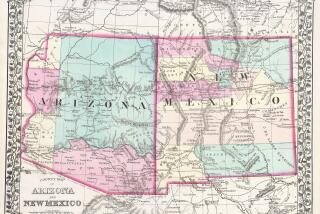Pakistani political donor in U.S. court
A Pakistani businessman accused of illegally funneling tens of thousands of dollars to the political campaigns of U.S. Sens. Hillary Clinton (D-N.Y.) and Barbara Boxer (D-Calif.) surrendered to the FBI on a year-old indictment Tuesday, then collapsed in Los Angeles federal court.
Looking tired and disoriented, Abdul Rehman Jinnah, 56, complained of chest pains and began shaking an hour into a contentious bond hearing before U.S. Magistrate Judge Patrick J. Walsh. The judge interrupted the hearing for nearly 30 minutes while paramedics attended to Jinnah.
After Jinnah’s condition was stabilized and he was taken to a local hospital for an examination, Walsh set bond at $300,000.
The drama unfolded shortly after Jinnah, who has a history of heart problems and diabetes, flew back to the U.S. from Pakistan to answer charges by a grand jury that he engineered illicit donations to Clinton’s political action committee and Boxer’s 2004 reelection campaign.
Officials from both campaigns have said they were unaware of the alleged wrongdoing and returned the contributions.
At Tuesday’s hearing, Assistant U.S. Atty. Dennis Mitchell urged the judge to deny Jinnah bond, arguing that he was a “tremendous flight risk” with a long history of financial misconduct that included five bankruptcy filings that had been dismissed by the courts.
Mitchell said authorities suspected that Jinnah returned to the U.S. to face federal charges only because the government had initiated travel restrictions that made it increasingly difficult for the businessman to travel overseas.
“The government’s position is that he is coming back just to test the waters” and could flee again if he believes he will be imprisoned, Mitchell said.
But Jinnah’s attorney, former federal prosecutor Douglas Fuchs, said that was “absurd,” noting that his client had voluntarily surrendered and faced only one to two years in prison if convicted. Fuchs said his client went to Pakistan last year to tend to his ill mother and delayed his return because of his own health problems.
Fuchs said his client did not know the indictment had been returned against him in May 2006 when he flew to Pakistan later the same month.
It was near the close of Tuesday’s hearing, during a discussion of his assets and setting bond, that Jinnah, handcuffed and behind a glass partition, suddenly fell back in his chair. After paramedics whisked Jinnah to a hospital, defense attorneys Fuchs, Thomas Holliday and Robert C. Bonner assured the judge that the proceeding could continue.
The lawyers are with the firm of Gibson, Dunn & Crutcher, where one of Jinnah’s sons also is an attorney.
Born in Pakistan, Jinnah immigrated to the U.S. in the late 1980s and settled in Northridge. Over the next decade, he tried his hand at a string of businesses and left a trail of angry creditors and former business partners, many of whom accused him of making grandiose promises he failed to fulfill, court records show.
But by 2004, Jinnah had positioned himself as a point man who could help the Democratic Party tap the increasingly affluent Pakistani American community for campaign funds.
He and his family personally contributed $122,000 to Democratic candidates and organizations that year and held events for Clinton and Boxer at his home.
Jinnah’s legal troubles began when he allegedly attempted to circumvent federal contribution limits by reimbursing friends, business contacts and their family members for contributions made in their names.
From June 2004 to February 2005, according to an indictment, Jinnah solicited nearly $60,000 in political contributions to Clinton and Boxer from more than a dozen “conduits,” reimbursing them with funds from his company, All American Distributing, a cellphone wholesaler.
The scheme the indictment lays out allowed Jinnah to get around limits then in effect on individual donors of $5,000 per year to political action committees and $2,000 per election to candidates, as well as the ban on using corporate money for political donations.
Stuart Schoenburg, 76, a Tarzana television producer charged as Jinnah’s co-conspirator, has pleaded guilty to a misdemeanor count and is awaiting sentencing.
More to Read
Get the L.A. Times Politics newsletter
Deeply reported insights into legislation, politics and policy from Sacramento, Washington and beyond. In your inbox three times per week.
You may occasionally receive promotional content from the Los Angeles Times.






